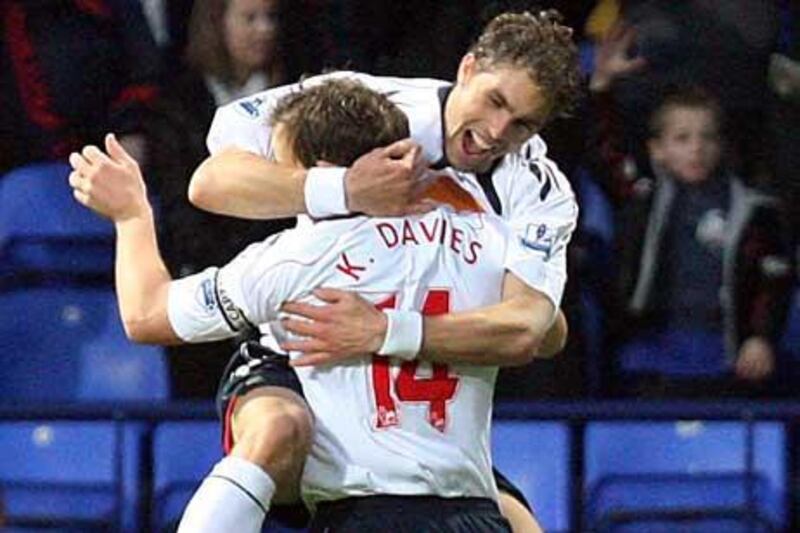Perception can be everything. Whether or not they like it, clubs acquire an image that precedes them.
For years, Bolton Wanderers became a form of footballing shorthand for a place that was cold and windy, where the home side were fierce and aggressive and the set-pieces accurate and directed at a battery of big men.
Then, rather against their wishes, Bolton's identity evolved. They came to epitomise an emphasis on ugly survival, the rows of empty seats summing up the death of the Premier League dream as an unedifying reality set in.
Now, once again, Bolton has a new meaning. This is a club characterised by exciting and expressive football, where optimism and overachievement go hand in hand.
Some of the empty seats remain, but this is a recession in which towns like Bolton have been unfairly targeted. Now they illustrate the achievements of the underdog.
For 24 hours this weekend, they occupied the final berth in the top four before Manchester City reclaimed it with a 3-0 win against Fulham on Sunday.
It was just reward for a year of rebranding under Owen Coyle. While the visiting supporters at Craven Cottage chorused "boring, boring City" after seeing their side score a fourth goal, they could have been echoing the sentiments of their Bolton counterparts.
Long deemed defensive, Bolton are outscoring all bar the top three, averaging almost two goals per game and, in their last two home matches, they struck four times against Tottenham Hotspur and put five past Newcastle United.
As Kevin Davies, the captain, said: "The Reebok's the place for excitement at the minute."
That was the sort of comment that, not so long ago, would have met with sniggers. Not now.
The transformation is all the more stunning because it has been achieved with essentially the same personnel. Only one of Coyle's signings, the American Stuart Holden, has started a league game this season. Yet he is indicative of a switch from reactive to proactive, from the negative to the positive.
Like Jack Wilshere, when borrowed from Arsenal last season, Holden operates as an attacking central midfielder. It was an alien concept to Coyle's predecessor, Gary Megson.
Tactically, Holden (signed on a free transfer, as Coyle is eager to point out) symbolises the regime change at the Reebok, but it is personified by Johan Elmander.
Megson's expensive folly has been reinvented as a fearsome force. The rampaging, rampant Swede struck twice against Newcastle; only Carlos Tevez has more Premier League goals.
Mockery is replaced by eulogies, especially after Elmander's Bergkamp-esque display of fancy footwork when he scored against Wolverhampton Wanderers last week.
It was surely Bolton's goal of the season but not, in one respect, the most notable; that came in a midweek friendly against Cliftonville and was scored by a 44-year-old: Coyle himself. It was a moment that embodied the manager's infectious enthusiasm.
He inherited a depressed club, worn down by the grim attrition of their attempts to avoid relegation. He provided an injection of confidence, fusing the belief that Bolton were capable of a more endearing style of play with their age-old ability to be direct.
He has allied consistency of selection - seven players have started every Premier League game - with consistent performances; Bolton have lost just twice and only the unbeaten Manchester United have fewer defeats.
They are the statistics of challengers, compiled by the personnel who spent three seasons targeting nothing more than lower mid-table respectability. It justifies one of last season's most controversial decisions. When Coyle left Burnley for Bolton in January, many wondered if, a superior stadium apart, he was really upsizing.
Now the answer has been provided by Wanderers' makeover. Perception and reality are reunited, and Bolton are entertaining.
¿¿¿ Saturday's remarkable North London derby lends itself to any number of talking points, not least the title credentials of Arsenal and Tottenham.
But to pick just one, it is rare indeed that a manager can introduce a specialist goalscorer who does not find the net and it still ranks among the substitutions of the season.
But Harry Redknapp's half-time decision to bring on Jermain Defoe belongs there.
It, along with the outstanding Rafael van der Vaart's relocation to midfield, changed the game. And, perhaps, the season.
¿¿¿ Compare and contrast two beaten managers of the Claret and Blue persuasion this weekend.
Deprived of 10 sidelined players, Gerard Houllier refused to make excuses and talked of his young Aston Villa side needing to learn lessons after their 2-0 loss at Blackburn Rovers.
With a rather shorter injury list and more experience on the bench, Avram Grant kept complaining about the absentees who missed West Ham United's capitulation at Liverpool. One is a man taking responsibility, the other a manager seeking to escape the blame.
¿¿¿ Dismissals in defeat can be expressions of frustration, but the cost can only unfold over the coming weeks.
Wigan Athletic would probably have lost against Manchester United even if Hugo Rodallega had not jumped in two-footed at Rafael da Silva, but the consequence is that the top scorer misses rather more winnable games against West Ham and Stoke City.
Newcastle, meanwhile, are without Fabricio Coloccini, their centre-back, for three games after he elbowed Elmander.
It may prove to be a particularly damaging display of indiscipline for both.






